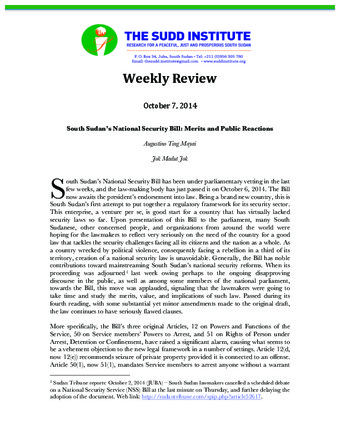South Sudan’s National Security Bill: Merits and Public Reactions

Authors: Jok Madut Jok, Augustino Ting Mayai
Organization: The Sudd Institute
Type: Weekly Reviews
Date: 07/10/2014
Publication Summary
South Sudan’s National Security Bill has been under parliamentary vetting in the last few weeks, and the law-making body has just passed it on October 6, 2014. The Bill now awaits the president’s endorsement into law. Being a brand new country, this is South Sudan’s first attempt to put together a regulatory framework for its security sector. This enterprise, a venture per se, is good start for a country that has virtually lacked security laws so far, and upon presentation of this Bill to the parliament, many South Sudanese, other concerned people, and organizations from around the world were hoping for the lawmakers to reflect very seriously on the need of the country for a good law that tackles the security challenges facing all its citizens and the nation as a whole. As a country wrecked by political violence, consequently facing a rebellion in a third of its territory, creation of a national security law is unavoidable. Generally, the Bill has noble contributions toward mainstreaming South Sudan’s national security reforms. However, when its proceeding was adjourned last week owing perhaps to the ongoing disapproving discourse in the public, as well as among some members of the national parliament, towards the Bill, this move was applauded, signaling that the law-makers were going to take time and study the merits, the value and the implications of such law. Passed during its fourth reading, with some substantial yet minor amendments made to the original draft, the law continues to have seriously flawed clauses.
This review provides an in-depth analysis into this new law, focusing primarily on resultant public opinion and what the new law constitutes for the South Sudanese general constituency as it complements and cements the existing operational culture of the National Security Service (NSS). The review ends with some policy directions.
Jok Madut Jok is trained in the anthropology of health and holds a Ph.D. from the University of California, Los Angeles (UCLA). He is a fellow of Rift Valley Institute and Director of the Sudd Institute. Jok has held fellowship positions at a number of other institutions, including the United States Institute of Peace and the Woodrow Wilson International Center for Scholars. He also served in the Government of South Sudan as undersecretary in the Ministry of Culture and Heritage for three years. He has also worked in aid and development and author of four books and numerous articles covering gender, sexuality and reproductive health, humanitarian aid, ethnography of political violence, gender-based violence, war and slavery, and the politics of identity in South Sudan and Sudan. His book Breaking Sudan: The Search for Peace, was published in 2017 by OneWorld.
Augustino Ting Mayai's Biography
Augustino Ting Mayai is the former Managing Director of the Sudd Institute. He is a founding Research Director of the same institution, serving in this capacity for a decade. He holds a Ph.D. in Sociology, with concentrations on demography and development from the University of Wisconsin-Madison. He currently studies how state effectiveness affects child health outcomes in South Sudan and Ethiopia. Dr. Mayai has written extensively on South Sudan’s current affairs. August is the current Chair (Statistician General) of the National Bureau of Statistics, Government of South Sudan.
